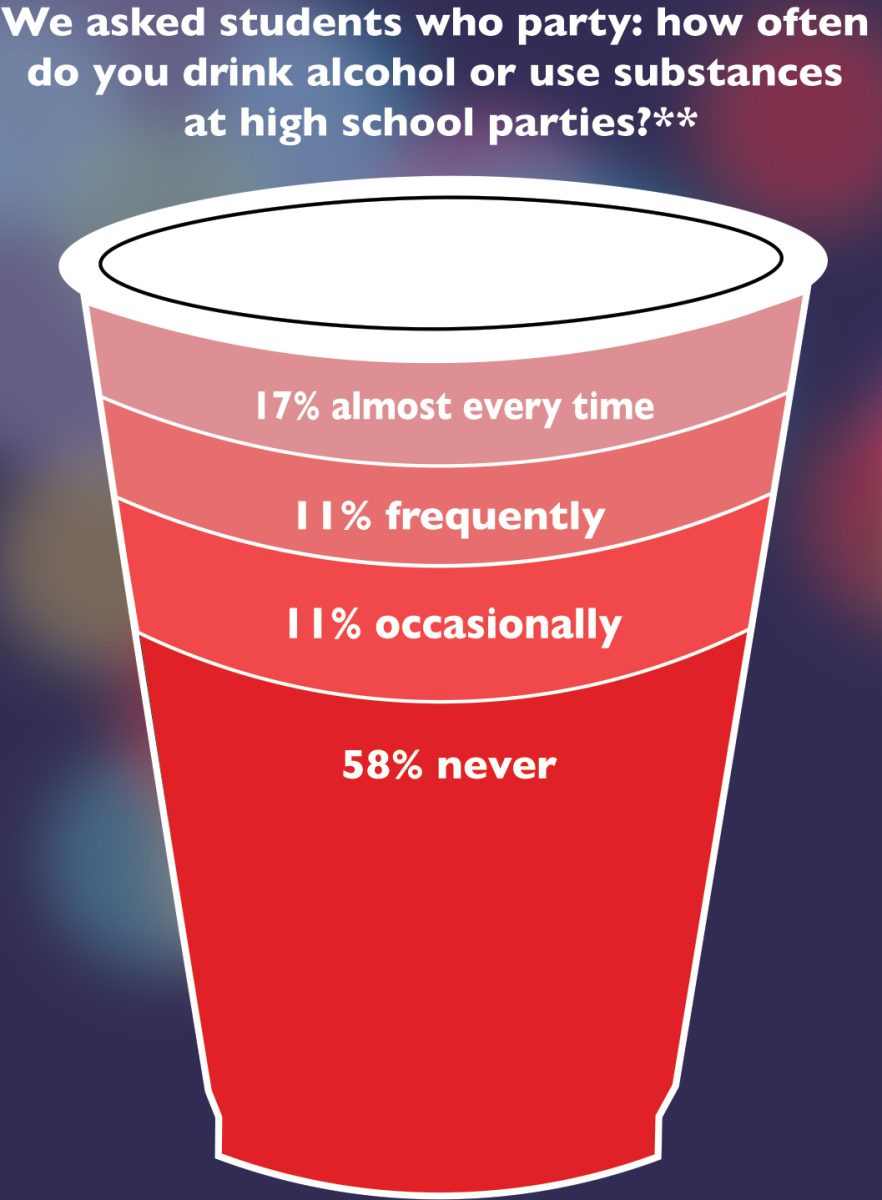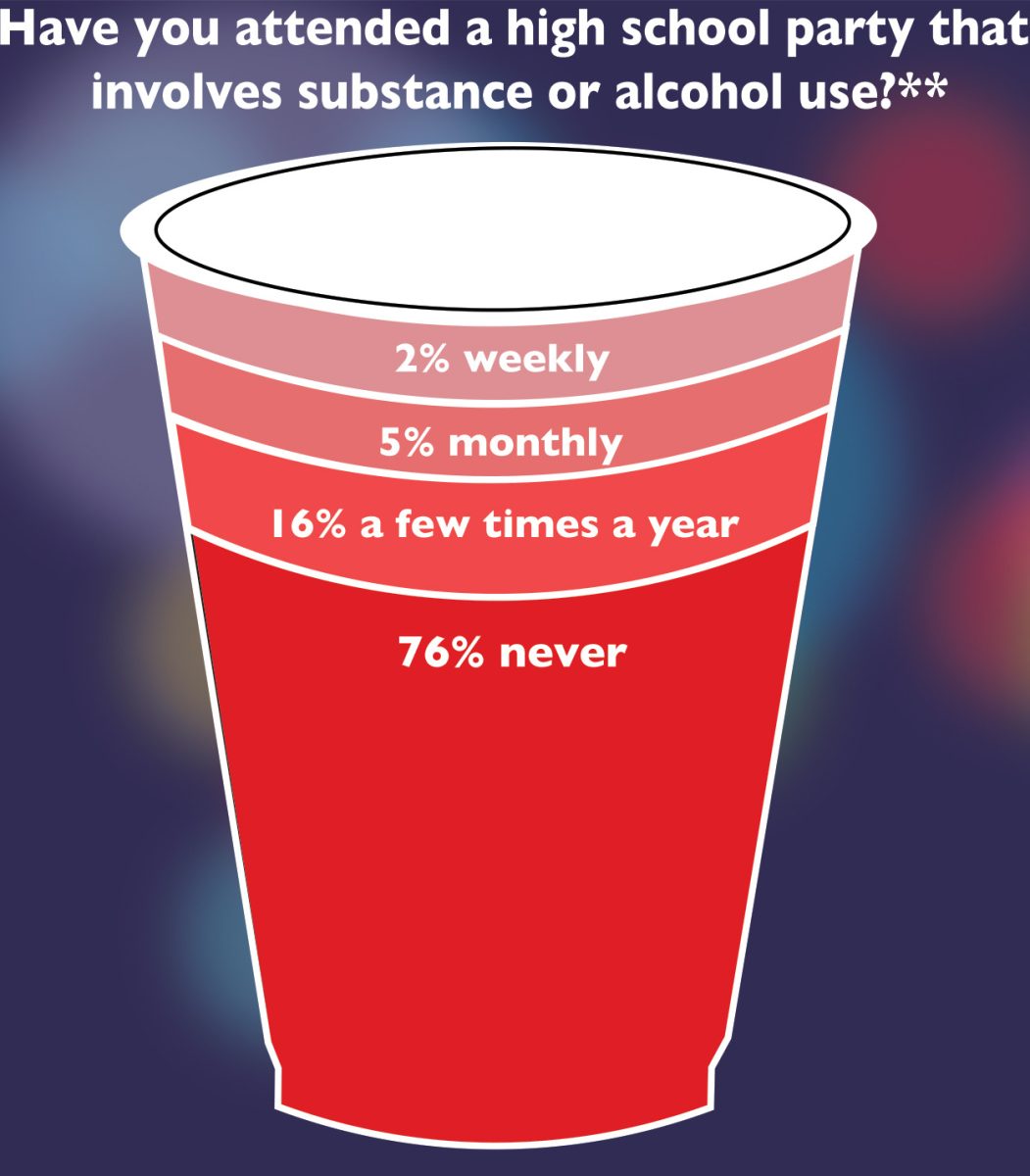To party or hardly party: Unpacking the high school dilemma
According to a poll of 93 students, 76 respondents said that they’ve never attended a high school party. The reason for this overwhelming majority could be the exclusive social web that shares party locations via social media.
Senior Terra York* (she/her), who is a regular partygoer, said that while many of the parties she attends are celebrations for events or holidays such as homecoming and Halloween, she also attends house parties she hears about via social media. While she said this can be a useful way to locate parties, it’s often risky.
“There’s Instagram sites, and people post parties on their Snapchat stories as well,” York said. “Sometimes that can get tedious, though, because when things are posted, more people know about it, and then it’s easier for the cops to come and shut it down. So, you really have to check your sources to make sure this is a legitimate party.”
Senior Joandra Teal* (she/her) also said that parties shared via social media can grow out of control, typically due to the irresponsibility of the host.
“I see some people on Snapchat will post them on their stories and text it to their friends, and they tell them to ask more people,” Teal said. “They just want as many people to go as they can because they feel cooler if they have more people going.”
While York said that these social media pages may be unreliable, they sometimes help her find backup plans throughout the night if hers fall through.
“There’s big group chats,” York said. “Someone texts ‘What’s the move for tonight?’ And then they just keep sending addresses throughout the night. And when one party does get shut down they’re like ‘Everyone pull up to Marymoor Park.’ Or ‘Everyone pull up to Lake Washington High School parking lot.’”
Teal said that besides hearing about parties via social media, certain schools seem to have a bigger party culture. She said that knowing students who attend those schools can be key to getting invited to their parties.
“At Juanita, there’s way more parties. More of the kids are just known. You hear a name from one of those schools, and you know who it is. More of the kids at those schools go to parties, and they host more,” Teal said.
Junior Marciela Robles* (she/her) parties occasionally with friends. She’s noticed that the more well-known a student is for attending parties, the more they’re invited to.
“Some of my friends go to a party every weekend. They’ll go to two parties every weekend. I don’t; that’s a lot of work, and I got too much stuff to do,” Robles said. “If you’re known, you get invited to parties. People will ask my friends ‘Hey, are you going to the party?’ People will ask me if I’m going and I’m like, ‘What party?’”
Freshman Tonia Felipo* (she/her) started partying in 7th grade. She primarily attends parties hosted by her classmates and believes that those who feel left out of the party scene or are unaware of the social web tend to judge partygoers more intensely.
“The people who judge us for partying will be like, ‘Oh, I don’t like that, why are they doing that? It’s so weird.’ But I know that if they got invited, they would come,” Felipo said.
Normally (a party) is just complete chaos. You can barely hear the person that you’re talking to next to you,” York said. “There’s gonna be a lot of open cans everywhere — like on the floor and stuff — alcohol cans. Typically there’s a table for beer pong and stuff. A lot of the time, the alcohol is completely gone by the time you get there.”
While indulging in illegal substances is typically portrayed as a central part of high school parties, students also appreciate the social atmosphere and the connections they’re able to make. Others look forward to the respite from everyday life and the chance to release stress from school, work and relationships.
“I like to go to socialize and, a lot of the time, you’ll see people from other schools. You see a lot of the same crowds at these parties, so it’s definitely nice for the social aspect,” York said.
Besides exploring the host’s house and eating snacks, senior Estella Dot* (she/her) enjoys the break from everyday life and the chance to relieve some of her stress from the week.
“You go out with your friends, and it’s really fun because you can kind of block out everyone else and just enjoy being with your friends in that environment,” Dot said.
However, many students also see the negative aspects of partying in high school. Teal, who chooses to abstain from substances, said that the normalcy of high school parties, as well as drinking culture, contributes negatively to teens’ development.
“The way it’s so normalized is just like it feels like we’re trying to feel older when we’re just kind of wasting our childhood. It seems like more people just want to feel cool by drinking and doing that stuff,” Teal said.
For some, the consumption of alcohol and other substances is crucial to enjoying parties. Robles said that those who don’t drink are often viewed as weird or are forced to assume the role of designated driver.
“If you’re not drinking, it’s just not fun, because you’re just sitting there, and you’re watching a ton of drunk people,” Robles said. “And you’re babysitting drunk people.”
Teal said that she chooses not to drink at parties because of the negative health effects and her fear of addiction. While she’s confident in her choice, she said it can lessen her enjoyment of the party compared to her peers.
“I feel a little bit more awkward and kind of left out-ish, and it’s also just kind of weird,” Teal said. “I’m the only one who can actually think properly.”
In response to her abstinence, Teal has also experienced pressure from peers to try drinking, which she doesn’t appreciate.
“Every time I’ve been at a party, there’s always been somebody who’s like ‘Joandra, you should try drinking!’ And I’ve always said no, even as much as they’ve begged me,” Teal said.
While York said that her friends don’t intentionally pressure her, she said that peer pressure sometimes plays a role in her choice to attend parties she doesn’t want to. Robles said the same.
“Sometimes I just feel like having a night in. But if there’s something all my friends are doing, like everyone’s going out and everyone’s gonna drink, then I’m like ‘Oh, I have to go do this.’ Because, I have really bad FOMO in general. So when I know something is going on I’ll put everything else aside, and I’ll step up and go,” Robles said.
Most interviewees also said that it’s important to remain aware of your surroundings. According to Robles, when attending a party with strangers, she tends to “pregame” with people she trusts — drinking with her friends before a party instead of drinking the alcohol provided there.
“Last year I went to a party my friend heard about by word of mouth, and it was sketchy. Everyone was drinking, everyone was smoking weed. There wasn’t even room to walk. And I was like, ‘I don’t want to drink,’” Robles said. “I don’t know what things are laced. I don’t want to get roofied because I have to be home by midnight.”
Senior Elias Lydos* (he/him) said that partiers should be aware of potential violence. He said aside from seeing firearms at multiple parties, he’s also witnessed physical fights.
“I turn around, and I see this dude get picked up, and then he gets f****** thrown and then a bunch of flashlights start turning on and they all start beating his a**,” Lydos said. “I was like, ‘What the f*** just happened?’”
Teal, who’s hosted multiple parties at her home, said she’s found it difficult and frustrating to control masses of intoxicated teenagers. Often, she said, people will drunkenly make poor decisions, like going for a swim in the lake or trying to use her lawn mower.
“It’s so stressful and it feels like everything is out of your control completely, which is very hard,” Teal said. “It’s just really stressful trying to manage so many people, especially when they’re in the state of mind where they don’t even know what they’re doing.”
Teal said that the large volume of people and noise at parties sometimes results in the police coming to shut them down.
“When the cops get called — that’s always kind of scary, because everybody’s usually drunk and just running,” Teal said.
York, however, said that the police aren’t something people should be scared of at parties. If the party she’s at does get shut down, she said there are typically other events going on that she’ll go to instead.
“I don’t think there’s anything to be scared of, because the cops aren’t there for you,” York said. “They’re just there to shut down the party. And a lot of the time they’re really nice and stuff, but they’re just doing their jobs.”
York said that she believes parties are the way to enjoy teenage years and create lasting memories.
“I just really believe in a high school experience,” York said. “I think that’s really important to be able to build those crazy memories — obviously everything in a safe manner – but making sure that you really get out there because this is your opportunity to go and be stupid and stuff.”
Despite being prevalent in the lives of some high schoolers, partying is something other students such as senior Annie Taylor (she/her) try to avoid. She said she avoids parties because they don’t align with her morals and aren’t how she prefers to spend her time.
“I don’t want to get involved in any alcohol or drugs, and I don’t really want to be around people involved in it,” Taylor said.
She said she thinks people turn to partying and the substances involved as a way to de-stress. After learning about the negative effects of drinking and doing drugs in health class, such as damage to the heart, liver and brain, Taylor finds it strange that people don’t pay as much attention to these dangers.
“I don’t think it’s an uplifting atmosphere. I don’t think it takes people and makes them feel better about themselves, or makes you feel good.”
Sophomore Tyson Arthur (he/him) also thinks people party to de-stress and get away from their school lives but said he believes they end up lagging in their academics.
“The people I know that party — falling behind, definitely, because they spend a whole night not doing anything,” Arthur said.
He said he doesn’t feel like he’s missing out on anything by not participating and doesn’t intend on partying in the future. Contrastingly, junior Anouk Balog (she/her) said she would like to attend a party during her time in high school.
“I’ve never gone to a party, but I think I would like to go to one at least, just to experience it,” Balog said. “Because it’d be kind of sad if I’d never gone to a party, right?”
Balog said she hasn’t attended a party because she wants to go with her friends, but they don’t participate in party culture. She said she would like to go and dance at a party with her friends.
“I think it’s just fun being with your friends; I wouldn’t want to do it alone. I would love to do that, have relief from academics and hard stuff, and balance it,” Balog said.
During her visits to Romania, where her parents are from, she has seen that people in Europe are able to balance their partying with the rest of their lives.
“My fear is that parties in the U.S. have more people who go too far whereas people in Europe kind of live in moderation,” Balog said. “You can’t go too far with substances and also be good in academics and again, there’s just kind of that balance that people can do in Europe. I haven’t been around people in the U.S. that can do that as well.”
In order to balance out their academic lives and get away from the stress of school, non-partiers turn to other hobbies and spending time with their friends.
“It’s just a different form of hanging out, so game nights and movie nights, or like Friendsgiving dinner. Those sort of activities are really uplifting to me, because it’s a super fun, good atmosphere,” Taylor said, adding that it is difficult for her to find time for them because of her busy academic schedule.
Arthur also finds alternative ways to de-stress, including hobbies like baking. As a partygoer, Dot thinks that not partying won’t necessarily impact one’s high school experience.
“I think you’re fine if you don’t, if you find the people you like — your friends,” Dot said. “Not everyone likes to party, and that’s fine, as long as you have a group of people that enjoy doing the things you like doing.”
In the end, Balog said that her choice not to party reflect the saying “Who you are is who you hang out with,” as her group of friends aren’t the type to go. Similarly, Taylor said it comes down to the people you decide to surround yourself with.
“When I do (go out), it’s just more intimate, smaller things, with people that are uplifting me, that I’ve chosen as the people that I want to hang out with because they make me feel better.”
*Names changed for anonymity using a random name generator
Party Safety Tips:
-Don’t go alone
-Plan ahead
-Check in with your friends
-Only get in the car with a designated driver
-Don’t accept food and drinks from anyone you don’t trust
Washington State Legislature states, “It is unlawful for any person under the age of 21 years to possess, consume, or otherwise acquire any liquor.” (Washington Law RCW 66.44.270)
Nordic News does not endorse any violation of this law. Any substance use should be done legally and safely for all individuals involved.
Resources:
988 – Suicide & Crisis Lifeline
(844) 289-0879 – National Drug Helpline
800-267-5463 – Confidential Hotline for Law Enforcement
















